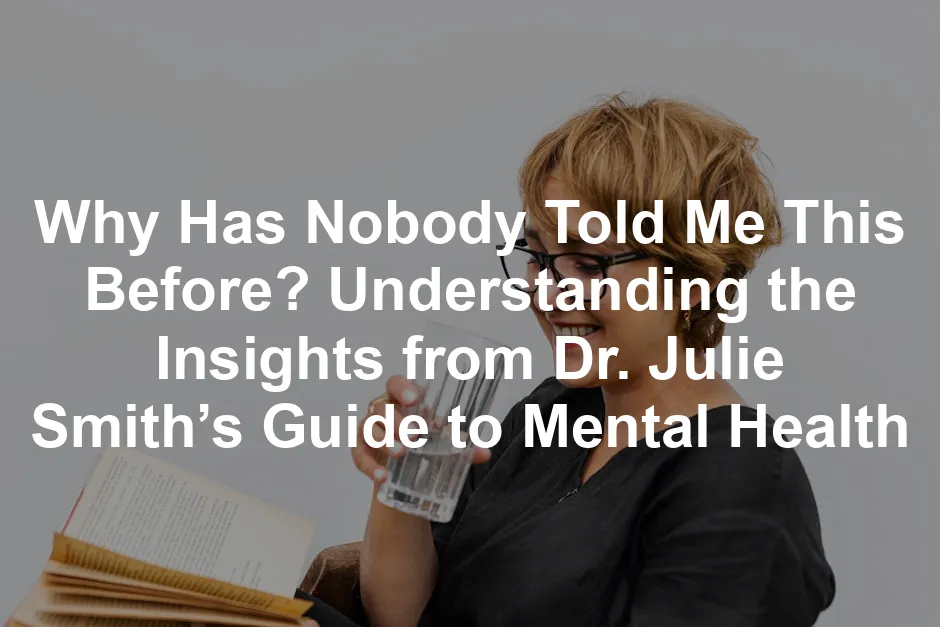
Why Has Nobody Told Me This Before? Understanding the Insights from Dr. Julie Smith’s Guide to Mental Health
Introduction
“Why Has Nobody Told Me This Before?” is a powerful book by Dr. Julie Smith. It sheds light on mental health, making critical insights accessible. This article aims to highlight the key lessons and practical advice found in her insightful guide. If you’re looking to dive deeper into your mental well-being, consider checking out “Why Has Nobody Told Me This Before?” for a comprehensive understanding of mental health.
Summary and Overview
In her book, Dr. Julie Smith shares practical strategies for everyday mental health challenges. With over ten years of experience as a clinical psychologist, she effectively combines expert knowledge with relatable advice. Her approachable writing style resonates with readers, making complex concepts easy to grasp.
Dr. Smith discusses vital topics such as anxiety, self-doubt, and emotional pain. Her book stands out in current mental health conversations, addressing these issues with compassion and clarity. It’s no surprise that it has gained immense popularity, selling over a million copies worldwide. In an era where mental well-being is paramount, her insights serve as a much-needed resource for many.

To complement your journey, consider keeping a Mindfulness Journal. This can serve as a daily reminder to reflect on your thoughts, feelings, and growth.
Understanding the Author and Her Approach
Dr. Julie Smith: Background and Expertise
Dr. Julie Smith is a seasoned clinical psychologist with over ten years of experience in her field. She has dedicated her career to making mental health education accessible for everyone. Her innovative approach includes utilizing social media platforms, particularly TikTok, to share insights on therapy and mental health. This strategy has allowed her to reach a younger audience, helping them understand complex psychological concepts in relatable ways. During the pandemic, her follower count surged to three million, showcasing her impact. Dr. Smith’s unique blend of expertise and creativity positions her as a leading voice in mental health advocacy.

The Importance of Mental Health Awareness
Mental health is more crucial now than ever. With increasing stressors in our daily lives, awareness is vital for overall well-being. Many people struggle silently due to stigma surrounding mental health issues. This stigma often creates barriers that prevent individuals from seeking help. Society needs to recognize that mental health is just as important as physical health. Open discussions can break down these barriers, encouraging those in need to seek support. By raising awareness, we can create a more compassionate environment where everyone feels empowered to prioritize their mental well-being.
To assist in your mental health journey, consider using a Guided Meditation CD to help you relax and center your thoughts.
Key Themes and Insights from the Book
Managing Anxiety
Techniques to Alleviate Anxiety
Managing anxiety is essential for emotional well-being. Dr. Julie Smith offers practical strategies to help you cope effectively. One key technique is square breathing. This method involves inhaling for four seconds, holding your breath for four, and exhaling for four. Focusing on your breath can calm your racing thoughts.

Mindfulness is another powerful tool. You can practice it by observing your surroundings without judgment. This helps ground you in the present moment. Journaling is also encouraged. Writing down your feelings allows you to process emotions and reduce anxiety. Together, these techniques create a toolkit for managing anxious moments.
If you find that coloring helps you relax, a Stress Relief Coloring Book can be a delightful and therapeutic way to unwind.
Building Self-Confidence
Overcoming Self-Doubt
Building self-confidence is vital for personal growth. Dr. Smith emphasizes the importance of self-compassion in overcoming self-doubt. Instead of criticizing yourself, treat yourself with kindness. This shift in mindset can lead to increased self-esteem.
Set small, achievable goals to boost your confidence. Celebrate each success, no matter how minor. Visualization techniques can also help. Picture yourself succeeding in various scenarios to build a positive self-image. By incorporating these practices, you can foster a more confident and resilient mindset.

To help visualize your goals, consider using a Vision Board Kit. This can serve as a creative outlet for your aspirations!
Coping with Emotional Pain
Dealing with Grief and Loss
Grief and loss can feel overwhelming. In her book, Dr. Julie Smith emphasizes understanding grief’s stages. She breaks down feelings into manageable parts. This makes emotions less daunting.
Dr. Smith suggests several coping mechanisms to help navigate grief. One effective strategy is expressing your feelings through journaling. Writing can bring clarity and relief. Talking to trusted friends or family also helps. Sharing your story can lighten the burden.

Another technique is creating a memory box. Fill it with items that remind you of the person you lost. This can serve as a personal tribute, allowing you to cherish memories while processing your feelings. Remember, grief is a journey; be gentle with yourself.
Consider incorporating a Breathing Exercise Timer into your routine to help you focus on your breath and find calm amidst the chaos.
Finding Motivation
Techniques for Reigniting Passion
Finding motivation can sometimes feel elusive. Dr. Smith offers practical methods to overcome procrastination. One helpful strategy is breaking tasks into smaller steps. This makes them less intimidating.
Set achievable goals, focusing on incremental progress. Celebrate small wins to boost your confidence. Creating a daily to-do list can also keep you on track.

Another approach is visualizing your success. Picture yourself achieving your goals, which can ignite passion. Surround yourself with motivating quotes or images. These reminders can inspire you to take action. Remember, progress is a journey, not a race. A Motivational Wall Calendar can provide daily inspiration!
Stress Management
Understanding Stress vs. Anxiety
Stress and anxiety are often confused but differ significantly. Dr. Smith clarifies that stress typically arises from external pressures. Anxiety, however, is an internal response, often related to fear of the unknown.
To manage stress effectively, Dr. Smith recommends several strategies. Prioritize self-care by incorporating relaxation techniques. Deep breathing exercises can help calm your mind.

Engaging in physical activity is another way to reduce stress. Exercise releases endorphins, improving your mood. Practicing mindfulness, such as meditation, can also center your thoughts. By understanding these concepts, you can better navigate your emotions and foster resilience. A Yoga Mat can enhance your practice and help you find your zen.
Forgiveness and Letting Go
Learning to Forgive Oneself
Self-forgiveness plays a vital role in mental well-being. Holding onto past mistakes can weigh heavily on your mind. It’s essential to recognize that everyone makes errors. Acknowledging your humanity can ease this burden.
To practice letting go, start by reflecting on your actions. Write down your thoughts and feelings about the situation. This can help you gain clarity and perspective. Next, consider what you would say to a friend in a similar situation. Often, we are kinder to others than to ourselves.

Challenge negative thoughts that replay in your mind. Replace them with affirmations of self-worth. Remember, learning from mistakes is a part of growth. Embrace the idea that it’s okay to move forward. By practicing self-forgiveness, you can free yourself from the chains of guilt. For a gentle reminder, consider using Affirmation Cards to uplift your spirit.
Practical Applications of the Book’s Insights
Everyday Mental Health Practices
Incorporating Techniques into Daily Life
Integrating the book’s techniques into your daily routine can be transformative. Start your day with a mindfulness practice. Even five minutes of deep breathing can set a positive tone. Consider keeping a gratitude journal. Each evening, jot down three things you appreciated that day.

Another practice is to set small, achievable goals. This can help build momentum and boost your confidence. Make it a habit to check in with yourself regularly. Ask how you feel and what you need to maintain balance.
Consistency is key in mental health practices. It’s not about perfection but rather progress. By committing to these routines, you can cultivate resilience over time. Small changes can lead to significant improvements in your mental health. A Daily Planner can help you stay organized and focused on your goals.
Interactive Elements and Resources
Utilizing Work Lists and Exercises
The book is full of interactive elements designed for personal growth. Each chapter includes practical exercises and work lists. These tools encourage active engagement with the material.
You can access these resources easily. Simply refer to the end of each chapter for specific exercises. They often include prompts for journaling or reflection. Make a plan to incorporate these activities into your week.
Utilizing these interactive elements can deepen your understanding. They also encourage you to apply what you’ve learned. By actively participating, you reinforce positive mental health habits. Don’t overlook the power of these tools in your journey toward self-improvement. If you enjoy arts and crafts, a Crafting Kit can be a great way to express creativity and relieve stress.

Conclusion
This article highlights crucial insights from Dr. Julie Smith’s book. Self-forgiveness and daily practices are essential for mental well-being. The book serves as a valuable resource, offering practical advice for personal growth. Explore its techniques to enhance your mental health journey. If you’re looking for a cozy way to unwind, consider a Weighted Blanket to wrap yourself in comfort.
Please let us know what you think about our content by leaving a comment down below!
Thank you for reading till here 🙂
All images from Pexels




